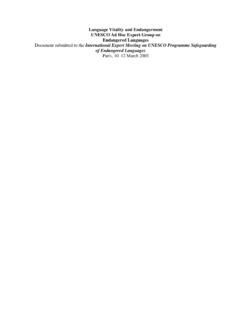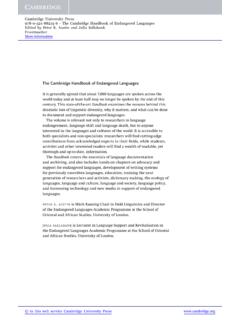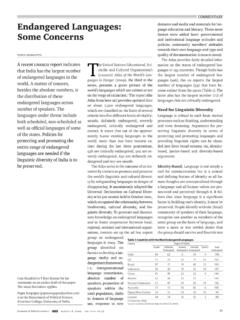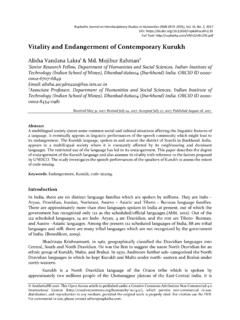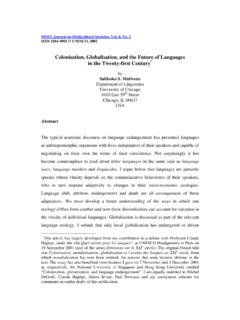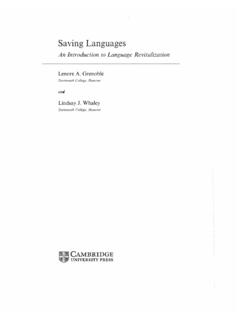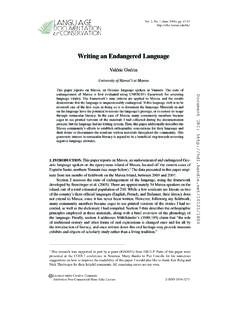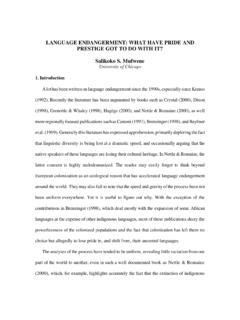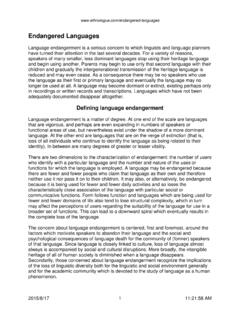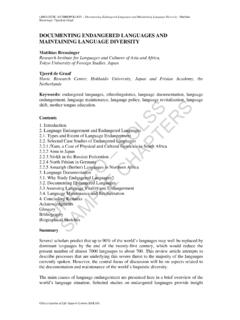Transcription of Endangerment scenario: The case of Yorùbá
1 California Linguistic Notes Volume XXXIII, No. 1 Winter, 2008 Adeleke A. Fakoya Lagos State University Lagos, Nigeria Endangerment scenario: The case of Yor b Abstract. Numerous perils, including death, may befall a language and render its growth or relevance somewhat pointless, leading to the birth of a population with little regard for their own languages and an untamed interest in a foreign tongue and culture. The Yor b language currently suffering from numerous perilous factors is purportedly spoken by more than 22 million people (Sachnine 1997), a figure that ordinarily should ensure its strength and survival for many more years to come. However, statistics obtained for this paper demonstrates that most modern speakers of Yor b : 1) cannot perform purely in the language without using the crutches offered by the English language 2) hardly enrich their talk with the legacy of proverbs and axioms 3) do not know the meanings encoded in their own names 4) have totally lost contact with their ecological heritage.
2 As a result, although Yoruba has been written since as early as 1800 and possesses a large population of speakers, it is facing an Endangerment scenario, especially with its speakers inability to express themselves without recourse or appeal to a foreign language ; in spite of its rich heritage, these speakers shun it and latch on to other languages for communicative efficiency. As a consequence the language , as well as its speakers as a community, may have reached its development plateau. Keywords: Yor b ; metalanguage failure; language Endangerment ; Endangerment scenario; development plateau California Linguistic Notes Volume XXXIII, No. 1 Winter, 2008 Introduction Perhaps a good way to start this paper is to present its focus as captured in the following recently overheard snatch of conversation: Yor b rich gan ni. In fact, wa native speakers of the language m kan t a m a lose if we should allow all its cultural flavour to go down the drain, just like that.
3 Mo serious. A m a really lose gan ni. Gloss: As a language , Yor b is very rich. In fact, we the native speakers do not know what we will lose if we should allow all its cultural flavour to go down the drain, just like that. I am serious. We will really lose a lot. Glancing at the vocabulary chosen leads to a surprising conclusion: language being spoken: Yor b Total number of words used: 43 Distribution of forms: Yor b : 15 English: 28 ?Winner: English Another good beginning subject would be to ask just how much Yor b the modern Yor b person is. Curiously, this question can also address the alienation being insidiously established in other Nigerian languages, especially the main ones , Igbo and Hausa. It is de rigeur for Nigerian scholars (including those in the departments of African languages) to study the troublesome effects of civilization, science, and technology on many other languages while being ignorant of the gradual decay that their own languages are undergoing.
4 Sadly, this phenomenon (pointing attention to the speck in the other person s eye while ignoring the log in one s own) is one of the reasons for the ongoing loss of Nigerian languages. In Nigerian academia, for instance, it is more profitable to study the grammatical details of foreign languages; this is believed to show scholarship and therefore attracts greater reward, promotion based on the number of papers one has published in foreign journals. The Yor b language is chosen for this paper as an illustration of a socially engendered crisis that has the ultimate potential of destroying the linguistic essence of its speakers. There are California Linguistic Notes Volume XXXIII, No. 1 Winter, 2008 3various causes of this crisis, each of them stemming from a unique aspect of the lives of the speakers of the language , aggregating to create a cause for worry for the foresighted linguist with the interest of the language at heart. The overall aim of the paper is to show how all the roots of the crisis culminate in the members loss of creativity, since they do not (or, indeed cannot) give the world something original using their own language .
5 In effect, this means that the members have reached their development plateau. Is the Yor b language really endangered? According to a UNESCO (2005) overview of the subject, language Endangerment is an extremely serious problem with great scientific and humanistic consequences. Furthermore, the review reveals that language loss always involves pressure which can be cultural, economic, military, political, social, or any combination of these. This view of Endangerment is directly a mirror of Tuhus-Dubrow s (2002) two-fold submission: first, that even the unlikely field of botany feels the threat of language Endangerment what with scientists primary reliance on, for instance, the vocabulary of Aboriginal Australian languages to research the area s ancient plant life; second, that, being the linguistic branch of the American empire, English has run rampant across the globe, in perhaps the most insidious form of linguistic imperialism: seduction.
6 For Tuhus-Dubrow, people want to speak English because it is the language of advertising, movies, music, and a vital tool for success. When Yor b is seen in the light of these observations, anyone very familiar with the language would readily conclude that there are a host of factors contending with its growth, especially in the present century. These factors are what Himmelmann (2005) describes as an Endangerment scenario. For Yor b , therefore, the Endangerment scenario is composed of the unpopularity of the language among members even for ordinary conversations; the superiority California Linguistic Notes Volume XXXIII, No. 1 Winter, 2008 4of English as the country s lingua franca; the attitude of the members to the language vis- -vis its economic value; and the failure of its numerous words for herbs and healing processes and the adoption of English expressions in their place. As if reinforcing the details of the Endangerment scenario, Mufwene (2002) remarks that the subject will be better understood if discussed in the broader context of language vitality , with more attention paid to factors which lie in the changing socio-economic conditions to which speakers respond adaptively for their survival.
7 As will be demonstrated in appropriate sections below, all these observations are valid concerning the present situation of Yor b . As Igboanusi and Lothar (2005) observe, Yor b is the second most widely used language in Nigeria (next to Hausa) but in spite of this seemingly enviable position, the Yor b are worried about the situation of their language . A profile of the modern Yor b member Many researchers and linguists may not think that the Yor b language is in a precarious transition in its deployment as a communicative tool among its native users. Given the constellation of Endangerment factors, the preservation of the language may not yet be seen as a requirement for its speakers literal survival. A second look at the conversational snatch above would make the curious researcher or linguist ask, which language shall we say this person is speaking? Well, the answer is in the translation: since the translation is into English, we should presume that the Yor b professor is speaking Yor b.
8 But really, is he? Curiously, the professor is not alone. Right from the time the modern city-grown Yor b child is of speaking or understanding age, the parents speak only English to him/her, a practice rooted in the social anomy enveloping the elite in most of Nigeria. And from that early beginning, the child is made to see culture as largely exocentric, since he is continuously tutored to disregard the rubrics of his own culture. When he is old enough to go to work, he prefers a profession to an California Linguistic Notes Volume XXXIII, No. 1 Winter, 2008 5 occupation . The New Society has reconfigured his thought pattern to be averse to everything his forebears did: for instance, that farming has no social prestige (because of its rural linkage) and that banking is the in-thing (with its fiscal benefits). As for the working language , he readily knows that Yor b , for instance, is not half as lucrative as English, and so he ignores every need to pay attention to the language and its cultural association.
9 Before long, by reason of cultural duality he becomes an official member of his native society and an applicant for membership in the foreign language . In other words, since he lacks a good mastery of his own language and possesses only a working understanding of the other tongue, he is culturally and linguistically neither here nor there. Then, by virtue of social regeneration, he passes on these features to his children and so on, ad infinitum, with all of them nursing, at each stage, the death of their language and culture and, ultimately, of themselves. A brief sketch of the Yor b language Sachnine (1997) reports that the Yor b language is spoken as a first language by more than 22 million people spanning the south-western parts of Nigeria, the neighbouring countries of the Republic of Benin and Togo. Estimates of the number of dialects vary from twelve to twenty-six, although there is a standard language . It has been written since as early as 1800, although there have been changes in aspects of its orthographic representation.
10 Yor b has proven to be fruitful for students of language . Its register tone system and vowel harmony system, extensive morphophonology, and numerous reduplicative processes are well documented and continue to be the subject of linguistic analysis. With this kind of history, would it be accurate to say that the language is threatened in any way? The hasty researcher might be tempted to say no , but then he would be wrong in the light of this paper s findings. California Linguistic Notes Volume XXXIII, No. 1 Winter, 2008 6 However, Nigeria s language policy has not helped the growth of any of the three major languages (Yor b , Igbo and Hausa). While each of these languages has many advocates recommending it as the national language or lingua franca, the recurrent rivalries among their speakers constantly make such recommendations unworkable. For instance, as Adegbija (1994) notes, while most of the social and political problems in Nigeria are not always related to ethnic and linguistic differences and attitudes, camps are often pitched along these lines.

